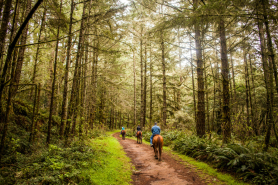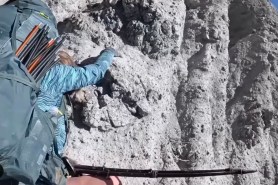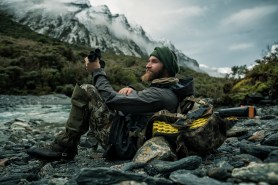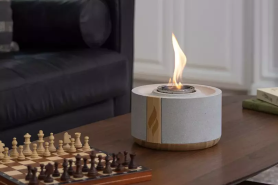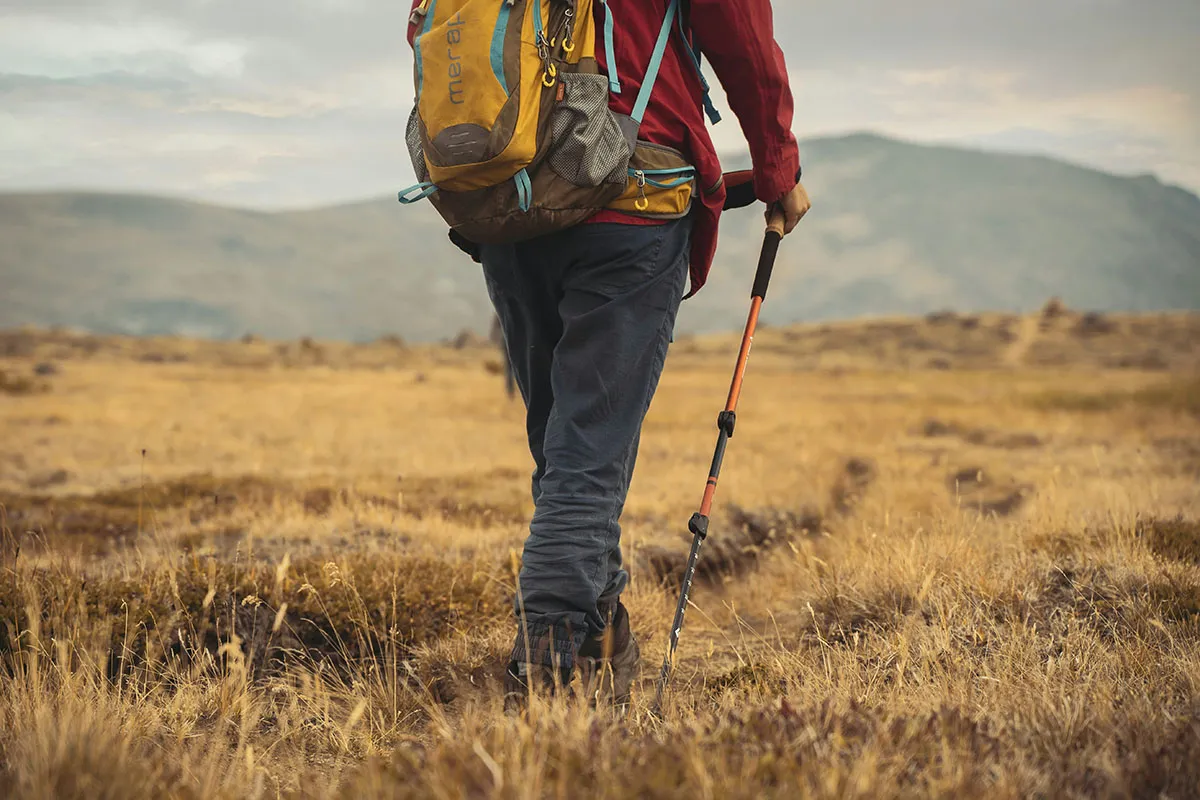

Trekking poles, or hiking poles, might seem like a piece of technical outdoor gear reserved for serious hikers only. However, investing in a sturdy pair of poles can help with stability for all levels of hikes.
Videos by Outdoors
While they help you keep your balance and footing on uneven ground, they also provide relief to the parts you use to stabilize your body like your feet, legs, and back. They can help to absorb shock as you have better control of your movement, allowing you to travel further, longer, and safer.
We chose the Black Diamond Pursuit poles for our top pick. The aluminum poles offer steadfast support across a variety of terrains, while cork grips offer hand support and sweat-wicking comfort on long hikes.
If you are looking to spend a little less, the no-frills REI Co-Op Trailmade or the lightweight Cascade Mountain Tech poles are two budget trekking poles to consider.
This post contains affiliate links. Outdoors.com may earn a commission when you make a purchase through these links. Thank you for your support.
The 7 Best Trekking Poles of 2024
- Best Overall – Black Diamond Pursuit
- Best for Women – Leki Cressida Cork Lite
- Best for All Weather – Leki Makalu Cork Lite
- Best Lightweight Trekking Poles – Black Diamond Distance Carbon Z
- Best Packable – MSR DynaLock Ascent Carbon Backcountry Poles
- Best for Trails – REI Co-Op Trailmade Trekking Poles
- Best Budget – Cascade Mountain Tech Trekking Poles
Best Overall – Black Diamond Pursuit

Specs:
- Maximum lengths: 49.2 inches or 55.1 inches
- Shaft material: Aluminum
- Collapsed lengths: 22.8 inches or 24.8 inches
- Weight per pair: 1 lb 0.4 oz or 1 lb 1.6 oz
The Black Diamond Pursuit poles are popular for their all-aluminum construction and sturdy durability.
You can traverse all kinds of terrain with these poles, from rough terrain to icy snow.
The poles are available in two sizes and two colors to suit all hikers. Their packable size is 26 inches long, and the Flick Lock+ allows adjustments to the pole length to be made easily while you’re on the go.
They feature sweat-wicking cork grips, algae-infused foam extensions, and wrist straps made from recycled fibers.
Best for Women – Leki Cressida Cork Lite
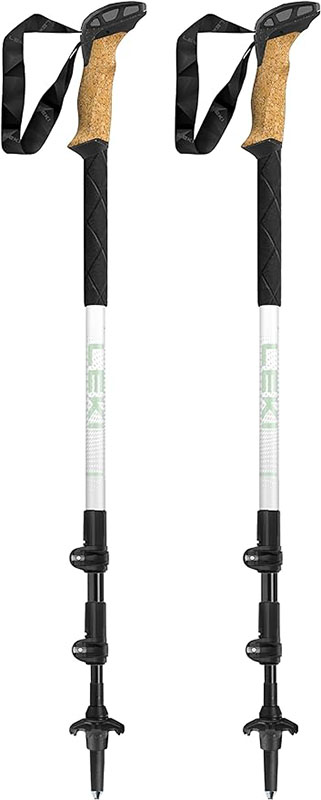
Specs:
- Maximum length: 49.2 inches
- Shaft material: Aluminum
- Collapsed length: 25 inches
- Weight per pair: 1 lb 1 oz
You can always bet on a pair of Leki poles to guide you through the mountains with great ease.
Designed for women, the poles can be adjustable between 100 and 120 cm (39-47 inches) with compact cork grips that suit small hands.
The poles can be folded into three sections, which measure 25 inches, so they can be stashed away into most sizes of backpack. They are light, weighing just 8.5 ounces each.
Many reviewers noted the expertly designed grips. Made from cork, they are customizable, and the material is moisture-wicking for extra comfort. Wrist straps are another handy addition, made from soft material that does not rub on your skin.
The aluminum lower section adds durability and stability on the mountains.
Best for All Weather – Leki Makalu Cork Lite

Specs:
- Maximum length: 53.1 inches
- Shaft material: Aluminum
- Collapsed length: 26.3 inches
- Weight per pair: 1 lb 2 oz
The Leki Makalu Lite is the unisex counterpart of the Leki Cressida, and we’ve chosen the cork grip variation for this list. There are several variations of the Makalu poles, all of which come highly recommended in the hiking community.
Considered to be one of the most durable trekking poles out there, the Makalu poles are perfect for trekking through remote places or traversing across uneven terrain.
The length can be adjusted to suit a wide range of heights. The simple locking mechanism allows for adjustments to be made while you’re out walking.
The Makalu Cork Lite features Aergon Air ergonomic grips for maximum grip and control for downhill sections.
Best Lightweight Trekking Poles – Black Diamond Distance Carbon Z
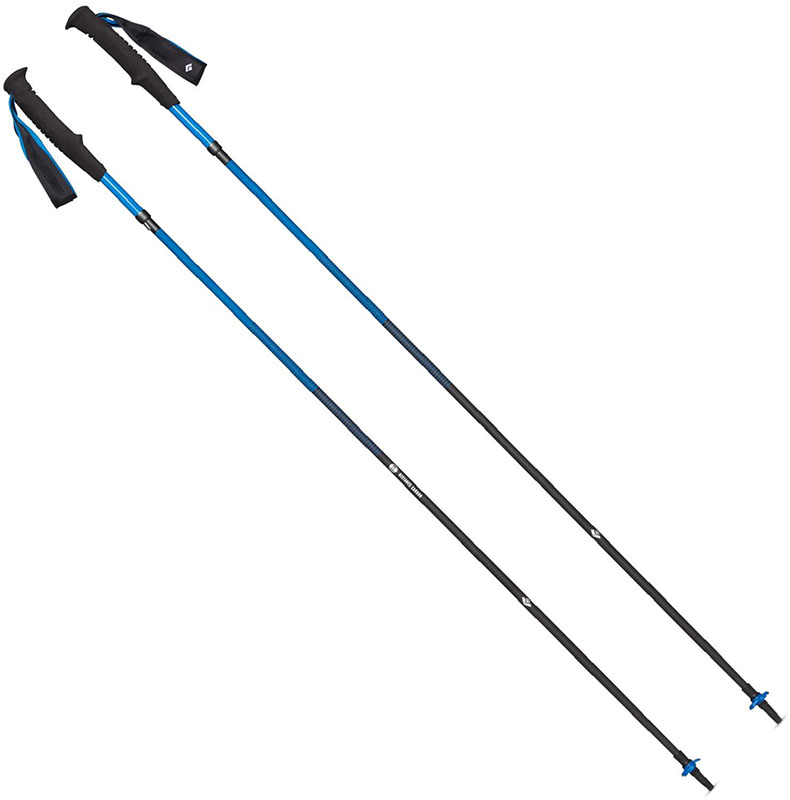
Specs:
- Maximum lengths: 43, 47, and 51 inches
- Shaft material: Carbon fiber
- Collapsed lengths: 14, 16, and 17 inches
- Weight per pair: 9.8 ounces
The Black Diamond Carbon Z poles are among the lightest trekking poles available on the market just now.
These poles only weigh about 9-10 ounces, depending on the length you choose, making them popular with trail runners and backpackers who plan to carry the poles for long periods of time in the pack.
The Carbon Z are made from 100% carbon and feature a three-section foldable design. The poles have ultralight EVA foam grips and a grip extension made from moisture-wicking sustainable materials.
They are unisex and come in a selection of five length sizes, so you can be sure to get the appropriate size for your height.
Best Packable – MSR DynaLock Ascent Carbon Backcountry Poles

Specs:
- Maximum length: 55 inches
- Shaft material: Carbon fiber
- Collapsed length: 17.5 inches
- Weight per pair: 1 lb 2 oz
These trekking poles are simple and elegant. They work well for many hiking situations, including snowshoeing, mountaineering, and split boarding.
Made from a carbon fiber shaft and featuring foam grips, they have plenty of room for adjustability. The Dynalock system is easy to use and allows for a secure lock. This pole can be very effective in a range of environments, from snowy mountainsides to everyday hiking adventures.
The small packed size of just 17.5 inches is more compact than most, making these poles a great option for travel or backpacking.
Best for Trails – REI Co-Op Trailmade Trekking Poles
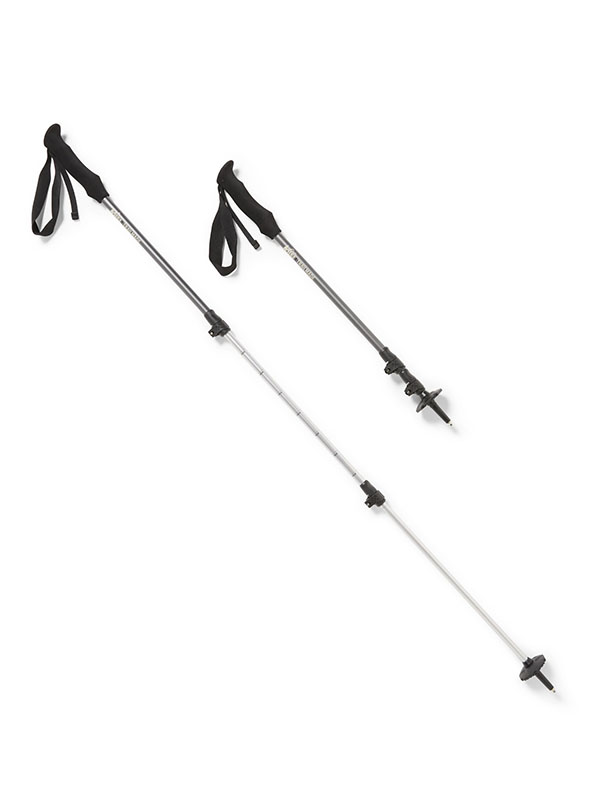
Specs:
- Maximum length: 55 inches
- Shaft material: Aluminum
- Collapsed length: 25 inches
- Weight per pair: 1 lb 1 oz
For a cheaper pair of trekking poles, REI Co-Op’s Trailmade poles are a good option if you want a functional piece of gear for occasional hikes on maintained trails.
They are a one-size unisex model made with an aluminum construction, with foam grips and trail baskets for support through soft soil and snow. They suit a range of heights from 5’1″ to 6′ tall.
While they do not offer the additional comfort features of more expensive models, such as padded wrist straps or cork grips, the Trailmade poles offer a reliably and sturdy option for under $80.
From the John Muir Trail to the valleys of Iceland, reviewers have enjoyed using these trekking poles across the world. If you’re sticking to trails, these are a great bet.
Best Budget – Cascade Mountain Tech Trekking Poles
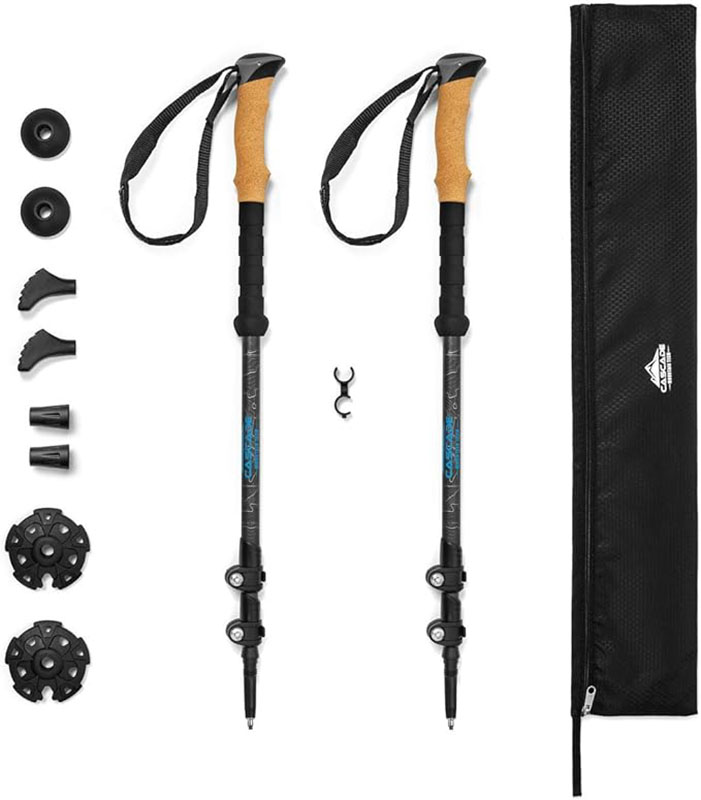
Specs:
- Maximum length: 54 inches
- Shaft material: Carbon fiber
- Collapsed length: 26 inches
- Weight per pair: 1 lb
The Cascade Mountain Poles are lightweight carbon-fiber poles with cork grips. They feature quick-lock technology that allows you to adjust to your required height, anywhere from 26 to 54 inches.
Suitable for multiple types of terrain, they come with snow and mud baskets, as well as a carry bag for portability. At $65, they are great value for money.
According to Cascade, the poles are equipped with an anti-shock design, which suppresses vibrations as you move along.
Features of Trekking Poles
There are a few different types of trekking poles, such as fixed length, adjustable, shock-absorbing, and ultra-lightweight.
They’re also made from a variety of materials, ranging from metal to composite to carbon fiber, and they come with different features as well. The features to note include grips, wrist loops, pole shaft, a locking mechanism, basket, and tip.
Pole Shaft
The pole shaft is the main component of your trekking pole. It’s made of durable materials, such as aluminum or carbon, and it is also the part that is either fixed or adjustable.
Pole Grips
Pole grips come in a variety of materials, including rubber, foam, cork, and plastic, and a variety of sizes as well.
Adjustability
Trekking poles can be adjusted to suit your height. Check the available sizes and measurements before you buy your trekking poles to make sure they will be right for you.
Telescoping poles are adjustable in length, allowing you to customize the height based on the terrain and your preference.
Folding poles, also known as collapsible or foldable poles, are compact and easy to pack but may have limited height adjustment.
Wrist Straps
Wrist straps tend to be more of a preference, but you use them to secure the pole to your wrist.
Padded straps can provide extra comfort and reduce the chance of blisters. Adjustable straps allow you to customize the fit.
Locking Mechanism
The locking mechanism is used to adjust the length of the shaft. They come in a variety of designs, including external, internal, twist, and button.
Baskets
The basket on a trekking pole is a small disc located near the tip of the pole. The basket helps stop you from pushing the pole deeper into the ground. Some trekking pole tips come with integrated or removable baskets.
Standard trekking baskets are relatively small and provide a good balance between preventing the pole from sinking and allowing easy movement on regular trails.
Snow baskets or mud baskets tend to be larger and wider, designed for trekking in a range of weather conditions. They prevent the poles from sinking too deeply into the snow or mud.
Tip
The tip is the point where the pole meets the ground. It typically consists of two parts: the body and the point. The body is usually plastic while the point is usually made from hardened steel.
Some trekking poles come with carbide tips for durability and grip on various surfaces. Rubber tips are useful for pavement or rocky surfaces.
How to Find the Best Trekking Poles
Now that we’ve learned the basic features to look out for, finding the perfect trekking poles is easy. Your purchase will depend on the kind of hiking you are planning to do, and where you will do it. Before you click “buy now,” be sure to think about the following.
Weight
Ultralight trekking poles can be very useful for traveling or if you are planning to carry the poles for long periods of time. However, lighter materials may be less durable over time.
Packability
Always check the collapsed length of the poles if you plan to transport them in a backpack or luggage. Sometimes, trekking poles can be strapped to the outside of your pack.
For trail running, a packable option is usually favorable so you can use the poles to make your way through some sections then pack them away when they are not needed.
Shock Absorption
Look for trekking poles that come with built-in shock-absorption systems. This can help to reduce the impact on your wrists and joints and is particularly useful on hard or rocky surfaces.
Brand Reputation and User Reviews
User reviews are great for gaining insight into how trekking poles perform in the real world. Look for feedback from hikers who have used the poles in similar environments to what you are planning.
Consider the reputation of the manufacturer. Established outdoor gear brands with a history of producing reliable products may be more likely to offer the best trekking poles.
You can always try out some trekking poles in store. Retailers such as REI Co-Op and Dick’s Sporting Goods have a good selection of trekking poles to try out.
Budget
Most high-quality trekking poles cost somewhere in the region of $100-$150 per pair, if not more. Brands like Black Diamond and Leki are trusted brands in this space, but their products can be on the pricey side.
If you’re looking to spend a little less but you still want decent poles for some extra support and balance, our picks are the Cascade Mountain Tech or the REI Co-Op Trailmade poles.
Frequently Asked Questions
Should I choose aluminum or carbon fiber poles?
Aluminum poles are generally more durable and resistant to bending than carbon fiber poles. They can withstand more impact, making them suitable for rugged terrain. Although aluminum is heavier than carbon fiber, it is less affected by temperature changes, so it’s a great choice for winter hiking.
Carbon fiber poles are lightweight, so they make great choices for backpackers. Carbon fiber is known for providing better shock absorption and vibration dampening, which can reduce the strain on your wrists and joints and make long hikes feel smoother.
However, carbon fiber may not be as durable or suitable for cold-weather hiking as aluminum.
How do I find the right length of trekking pole?
Before you start using your trekking poles, you should first figure out the best length for your height.
While there are different suggestions for exactly how long your trekking poles should be, a good rule of thumb is this: Grip your poles and then lock your elbow at a 90-degree angle so your forearm is parallel to the ground.
If the tip of your pole touches the ground, it’s the right length. While you’re using them, you should adjust for comfort and usability.
Learn more about how to use trekking poles in our step-by-step guide.
What grips are best?
There are several types of grip to choose from depending on your personal preferences. These include cork, foam, ergonomically designed, and rubber grips.
Cork grips are popular for their breathability, moisture-wicking properties, and their ability to conform to the shape of your hand over time. Foam grips are soft and provide a comfortable, cushioned feel. They may wear out more quickly over time than cork grips.
Rubber grips offer a firm and non-slip surface that is durable and resistant to wear. Look out for ergonomically designed grips that are shaped to fit the contours of your hand, which allows your hands to be comfortable for long periods of time.
Final Thoughts
Trekking poles can be an invaluable piece of gear for long hikes or navigating through tricky terrain.
Before you make the purchase, think carefully about how often you will use them and in what kind(s) of hiking conditions. Practice using them and nail the technique before you head off on your next adventure.
It’s easy to think that picking up a loose stick on the side of a trail will offer the support you need, but good quality trekking poles will help you to explore further whilst expending less energy.
For a great all-around buy, consider the Black Diamond Pursuit poles.
Also check out our day hiking essentials guide and pack list for more items to pack on a hike.




